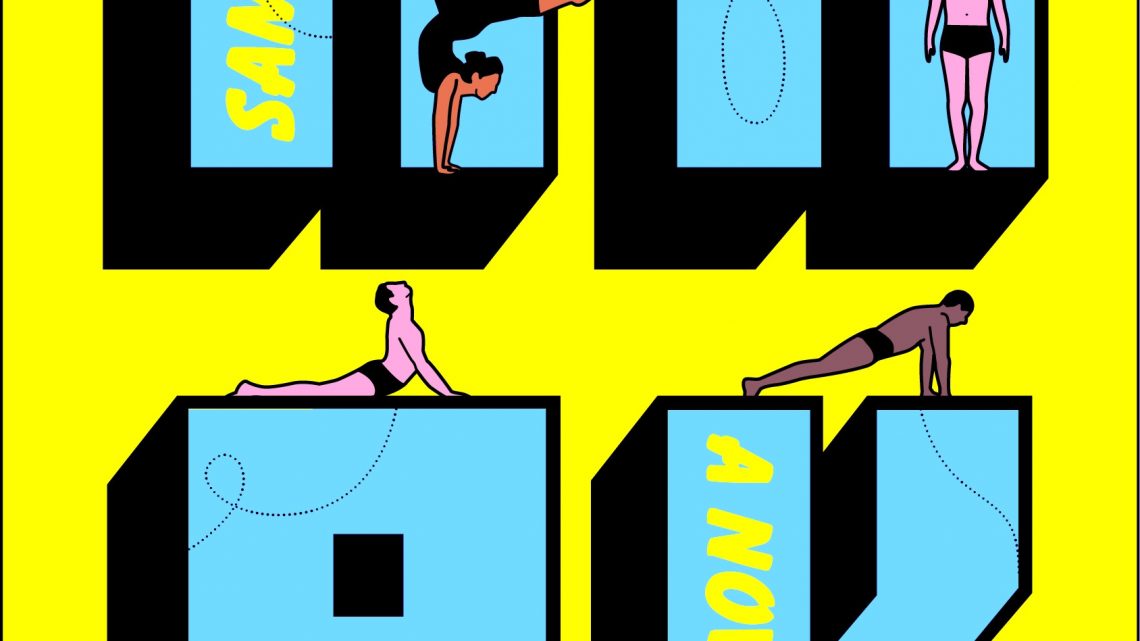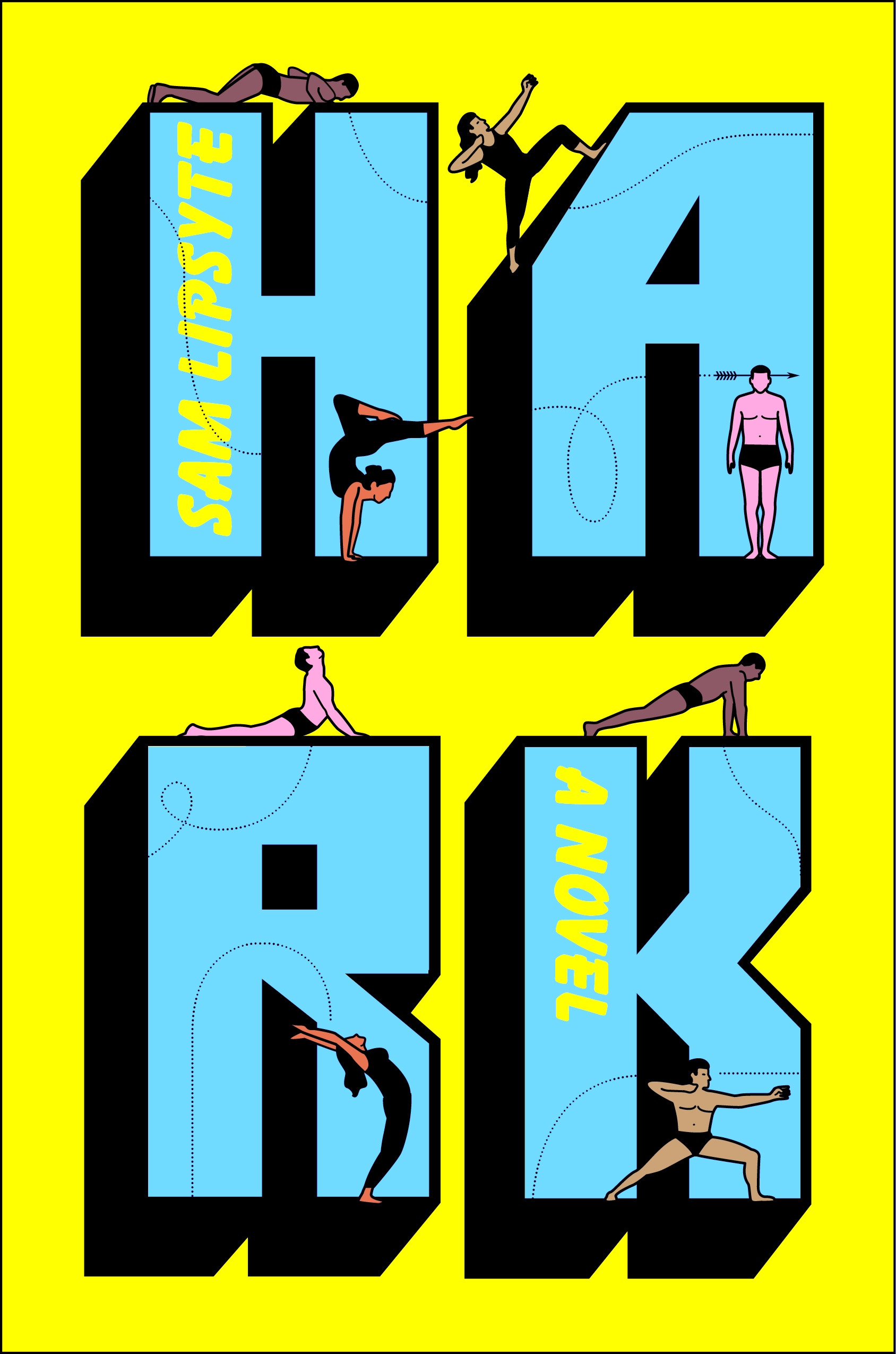
Sam Lipsyte Confronts the Apocalyptic Minutia
January 11, 2019How apt that Sam Lipsyte’s new novel, Hark, is about a pseudo-messiah and the rabble of weary citizens — bewildered by contemporary life, crushed by the jackboot of capitalism — who have found themselves in his thrall. For the last two decades, Lipsyte has been amassing his own ragged band of devotees and obsessives seeking respite from the postmillennial malaise.
Hark Morner, the enigmatic figure at the center of Lipsyte’s fourth novel, is a failed stand-up comic who becomes a self-help guru of sorts by espousing a form of deep concentration called “mental archery,” which helps people find focus in a time of chaos and distraction. Hark is trailed by a coterie of confused pilgrims, including Fraz Penzig, an underemployed tutor and gym-rat; Fraz’s wife, Tovah, a stalled poet whose day job in educational technology keeps their family financially afloat, but who can’t keep her marriage intact; and young heiress and group benefactor Kate Rumpler, who spends much of the novel trafficking bone marrow as penance for her privilege. Eventually, Hark’s fanatical followers schism. Corporate interests co-opt the movement. Things get a little bleak. And yet it’s all very, very funny.
Like Hark, Lipsyte’s writing makes us focus, with wild yet surgical swipes, dissecting the rampant jargon that assails us daily, the beautiful crap of culture, the ridiculous delusions that sustain our ridiculous lives. His novels and short stories can be alternately hilarious, acidic and heartbreaking—usually all at once. (Full disclosure: I was a student of Sam’s 16 years ago.)

VICE: At a clutch moment in Hark, the eponymous guru says, “What will finally destroy everything we’ve done is the fact that you people have no fucking sense of humor.” Earlier in the novel, as Hark’s floundering sycophant Fraz Penzig sits in a hospital with a comatose daughter and an eroding marriage, his wife tells him, “No jokes, Fraz. They don’t work anymore.” The book swings between these two poles: dark laughter and darker anguish. Where do you fall on the spectrum lately? Is Hark right? Is humor the thing that will save us in these perilous times?
Sam Lipsyte: I slide furiously back and forth along the spectrum. Maybe like it's the fretboard of a guitar. I dig the sound. Which is just to say the laughter and the anguish always go together, their tones enriching each other. The times are perilous, but history is full of perilous eras. The anxiety might be different, because it's harder to imagine a better world. There's a sense that it's too late for that, at least for a better world that can include humans. But maybe all will not be lost. Maybe just much will be lost. And while we struggle or not for the best possible outcome on that score, we have to keep figuring out who we are as a species, and what we can become. One of the things we happen to be are creatures who laugh and cry, on various levels for various reasons. Our laughter is intimately connected to our fears, our desires, our pasts and our world views. As is our despair. I think it all belongs in the literary experience.
Hark begins with a biblical epigraph and a stark, scriptural tone. Hark himself is a kind of harmless pseudo-messiah who ends up martyred nonetheless, and maybe even turns out to be the real thing. What is Hark’s connection to old-timey religious yearning? It sometimes seems like the fear of hellfire and last judgment has been replaced by, oh I don’t know, the prospect of getting mowed down at the mall by a jittery 18-year-old paranoiac. Has religion lost its capacity to terrorize us?
Well, I think there are still a lot of people out there invested in the old biblical narratives, and in some ways the new anxiety about our coming environmental end times seems part of this ongoing story. It's a strange thing to ask, but what really is the difference between being a person living in 999 AD who is convinced the world is about to end because of religious prophecy, and the person living now convinced the world (or the world as we know it) is about to end because of the terrible consequences of climate change (or even a trip to the mall)? Now, you can argue that they are different because the person in the 10th century is deluded whereas the person now is in possession of hard facts, which is true, but still, what is the difference in terms of how it feels—the fear, the anger, perhaps the resignation? Sure, maybe the religious person is banking on an afterlife, but who can know what that will entail? Could be eternal damnation. And there's still the scariness of the moment to contend with.
The religious currents in the book are a little goofy at first, but after a while they start to interlace more with the more terrifying aspects of reality, acquire some menace. It's not a kinder, gentler gospel. It's not exactly fire and brimstone either. It's more akin to the keystrokes of administrators in the cold, indifferent bureaucracy of the universe. And there is the Catfish, a horrendous figure all readers of this novel will tremble before.
You’ve always had a lot of lovable louts in your stories and novels, and some of your literary forebearers—guys like Barry Hannah, for instance—could come across as fairly loutish in their work. Or maybe it’s more accurate to say they explored and exploded loutish attitudes with wild comedy, à la Stanley Elkin and Leonard Michaels. Your recent work seems to be grappling with that tradition in a way.
I mean, if Hark was published ten or twenty years ago, I think Fraz would probably be center stage the whole time and he’d have full run of the show. He’s that classic sad dude type: he has a funky preggers porn fetish, he loves his family even if he can’t help but destroy them. But in this book, he’s shoved aside and we spend a lot of time with his wife, Tovah, who has her own overstuffed portfolio of disappointment and struggle. She’s not perfect, either, but it seems significant that, in the end, Fraz receives a kind of comeuppance while Tovah crawls out of the dogpile with a bit of hope.
You definitely pinpointed some heroes of mine. Based on your work, I'd venture you are fond of those writers as well. After Home Land and The Ask, it's not that I felt I was done with that sort of character, but I was definitely ready to explore some other viewpoints. The Fraz type will always be there for me to check in with. It's a little like looking in the mirror—the funhouse variety, of course. But I wanted to range a little, to extend the field of play. Because it is play. These are all fictional characters and they are all really extensions of my many selves, real and imagined. They can function as different angles, lenses, and so forth, but it's still the same writer seeing. Don't let anybody tell you different! So, I'm not purporting to render with exactitude what it's like to be a 45-year-old woman working in the tech sector in Manhattan—how could I?—but in exploring what it's like to imagine such a subjectivity, I might get to new places in my work. Empathy and invention. I still believe in them. Same process goes for the other characters whose perspectives I try to inhabit. But it's true that Tovah is a special case. I've been writing about her since the short stories in The Fun Parts. I'm not going to let her sink into the mire so easily. She's not mistake-free, but even with her keen awareness she holds out hope, and gets hope in return, perhaps. The world is on fire but she alone is able to experience the joy of creation.
Hark seems to me a wilder, but also deeper and bleaker, book than you’ve written before. This book has crow’s feet. It has stretch marks. Ultimately, I feel like it has more skin in the game. Wrinkly, stretched skin, I guess?
Yes, more wrinkly skin in the game. For sure. I'm feeling it. When I'm in the locker room at the gym now I'm newly aware of how much closer I am to being one of those old guys I used to see at the Y with their nut sacks at their knees. The droop has begun! I guess it all just drops one day. And then you stand there in your jiggle and wobble and decay and jabber on about all the apocalyptic minutia your crazy ass is clocking. Because the older you get, the more you can clock it. And the more you realize both how fucked your time is and how fucked every other time was as well, but within this, it is still possible to find warmth and love and human connection. These are ideas which maybe seemed corny or concessionary once but you now know are really at the core of everything, including social change.
As far as the deep bleakness of the book, it's in there, but I think there is a brand of gallows humor present as well, the kind that maybe helps sustain people through tough times. I mean, that's the whole point of the comic element. The laughter is meant as truthful recognition of the situation — it lends context, perspective and is also an act of commiseration. We're (most of us) all in this together. Whether it be the hypocrisies and pressures of the moment or the more long-standing problems with being alive, and all the ways those two categories collide.
One of the most poignant threads in Hark, I think, is just how beaten down and ultimately compromised the characters are. This was a big part of The Ask, and it reaches some sort of apex in Hark: the idea that maybe the only way to survive in this world is to trade in your ideals for some small semblance of security.
Look, I think I'm like many people. I'm always trying to negotiate this, always swinging between moments of fervor and imagined rectitude and ones where I recognize my weakness, my all-too-human responses, my flight-or-fight cortisol ODs, all that small stuff sweated so copiously, the anxiety and resentment. Maybe just getting out of bed in the morning is a concession! Maybe anything but an anti-natalist stance is compromise. But I don't really think that. Most of our concessions are sins of omission. It's all the times we don't speak up for somebody else. Or we do something shitty, maybe inadvertently, and don't make it right. Or it's when we get into that defensive crouch and feel that someone else must be destroyed for us to thrive. I feel like this is stuff that we can actually address in our lives, even as we have to go to our jobs—all of them implicated somehow in a gross system (though of course there are crucial distinctions to be made among these occupations!) — to feed ourselves and our families.
At the same time, “selling out” is also a quaint notion nowadays. What once was seen as a symbol of integrity can be viewed now as a kind of snobbishness. Everyone is so harried and anxious, we’re just grateful someone is still willing to buy us. It almost seems like mercy. How is an old-guard, Gen-X’er such as yourself handling this? Who, or what, are your models of integrity these days?
You, David Nutt, are a model of integrity! I'm not kidding. Hey, at first it was liberating to see the notion of "selling out" lose its purchase in the culture, because it really just got so unmoored from any meaning, and was simply the quintessential call-out phrase of its era. Anybody you disagreed with was a sell-out, and it was often just the tyranny of small differences anyway. But maybe it's time to resurrect the idea a tiny bit. Along with, well, not snobbishness, but some guidelines. Like, this is just off the top of my head, but I was thinking about movies recently, because I love them. I also love good movie criticism. But maybe it's very lame to pose as a high-minded film critic one minute and then fawn over the fifth iteration of some dumb Hollywood comic book franchise the next, and tell yourself you're doing it for the good of the industry, or that something idiotic should be praised because it "achieves its goals," and doesn't try to be more than it is. Fuck off! Let's all try to be more than we are! Can't we at least try! David! I’m foaming, and my testicles are on the tiles!
Finally, Sam, for a particular generation of writers and readers, you’ve been our Hark. A mordant truth-teller, a smart-ass sage. We’re looking to you for the answers, man. So spill it. What’s the secret?
Stick close to the people who make you laugh, who make you feel okay, or even good, about being alive. Defend them. Stay clear of the assholes, the douchebags, the users, the liars, the ungenerous, the unkind, the energy-suckers, the self-important, the self-righteous and the know-it-alls. Eat a lot of leafy greens. Stand in the meadow of your mind, ready your bow, nock your arrow. Focus. Release.
David Nutt lives in Ithaca, New York. His novel, The Great American Suction, will be published by Tyrant Books in February 2019.

